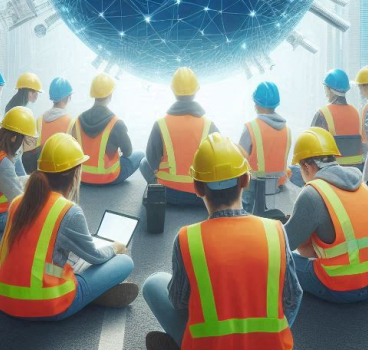Will Mindfulness reduce suicide rates in the construction industry?
The construction industry has this stereo-typical image of the macho male and in spite of the huge influx of women workers that perception has changed little in recent years. And because men are more likely to bottle up feelings of anxiety and depression there is no doubt that we are seeing an increase in mental health issues on building sites writes Michael Younge.
Just in case anyone is in any doubt, just look at the statistics. There were more than 13,000 suicides of construction workers in the UK between 2011 and 2015 according to the Office of National Statistics. This represented some 13% of the total workforce suicides in Britain – and to get this figure into perspective, construction workers as a whole only account for 7% of the working population.
As a result, we are now seeing the industry looking at techniques such as Mindfulness and positive thinking as a way of reducing the suicide figures and enhancing the lives of construction workers. This might seem like new age hippy speak but there is plenty of evidence to suggest that mindfulness promotes wellbeing and most importantly better health and safety – a vital part of the construction industry.
So what is Mindfulness? There have been many definitions but I prefer to call it – thinking in the NOW - by being aware at all times of our own feelings and surroundings, by allowing your thoughts to focus on the immediate situation. When practiced properly, it allows the person to forget about the past and to avoid future outcomes.
This is a very simple explanation and readers who want to know more should visit mywebsite– for once you have mastered the art of Mindfulness and positive thinking you can change your life, as this practice has been proven to reduce depression, anxiety and stress.
There is very little that's new about the subject - it has been practiced by Buddhist Monks for centuries - but there is now strong anecdotal evidence that building companies are looking to introduce such techniques as a way of reducing stress and promoting harmony within the workplace.
A more focussed workforce will make better decisions, be more positive about outcomes and objectives and most importantly, because they will become more aware of their feelings and surroundings – health and safety will also improve.
The biggest challenge for employers is to take the workforce with them. Unless individuals are prepared to buy into the concept of Mindfulness then it is clearly not going to work and there is no magic button that can be pressed that will transform an individual overnight – it takes commitment and practice and for many, it might be a step too far.
However, for those prepared to try, there can be enormous benefits. By nature our minds wander but Mindfulness promotes a feeling of success allowing individuals to be more vigilant and stay focussed on the job in hand for longer.
More importantly, the majority become more positive and this will change their attitude to work and life in general. Banning those negative thoughts is the first step to better mental health and wellbeing and hopefully, in time, it will lead to a reduction in those appalling suicide figures.
Michael Younge is an established blogger specialising in positivity and the benefits it offers to all of us. To read more visit: www.powerfulpositivethinking.org
Additional Blogs

Are apprenticeships a real investment in skills or just cheap labour?
Spend any time in the construction sector and you’ll hear the same two conversations running in parallel. The first is about the skills shortage with ageing trades, retirements outpacing recruitment,...
Read moreShould governments subsidise modular construction to solve the housing crisis?
There’s something deeply uncomfortable about the way we talk about the housing crisis in Britain. We describe it as “chronic”, “systemic”, “complex”. We commission reviews. We announce targets. We...
Read more

Do BREEAM and LEED really make buildings better?
Walk into the reception of any new office block and you’ll usually see it, framed proudly behind the desk - a certificate, stating BREEAM Excellent or LEED Gold - sometimes Platinum, if the developer...
Read more